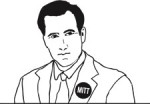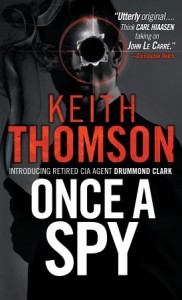February 6 2018 Update: With the sad passing this week of Bob Wietrak, longtime bookseller and publishing executive—with whom I was a colleague at Macmillan from 1987-1990—I want to point out to friends and readers of this blog that Bob was involved in a harrowing episode at one of our annual book conventions, at an ABA in the 1980s, the one time the trade show was held in Las Vegas. A key figure in the incident was Herman Graf, the longtime publishing pal whose surprise birthday party I wrote about below in 2012. Bob was at that party, too, seen in the background of the photo below.
In a phone call tonight Herman reminded me of some of Bob’s best qualities. Herman told me, “He had an uncanny talent for predicting what books would work big. He also had a knack for making publishers feel generally satisfied about the ordering and marketing decisions that the national book chain made about what books to feature, while also keeping B&N’s upper management satisfied.” Bob was laid off in a big B&N purge in 2011, when 40 people were let go, and went on to later jobs with online book sites Bookish and Zola. (I know about B&N’s corporate purges first-hand as in 2009 I was let go in a twenty-person layoff from Sterling Publishing, B&N’s publishing division, where I worked as Editorial Director, V-P of Union Square Press.) Nearly seven years after the party for Herman, I’m really glad that Bob Wietrak was there that night.
——
 Last night Kyle and I were delighted to join a group of several dozen well-wishers who sprung a surprise party in honor of Herman Graf and his 51 years in publishing. Herman walked in on the hushed throng which had assembled in the living room of Tony Lyons, founder of Skyhorse Publishing, expecting to join Tony for dinner, when in unison we let out with our “Surprise.” More than a bit stunned, Herman said, “It’s not my birthday.” It’s not even my Bar Mitzvah.” We took the photos accompanying this post in the first few minutes after he walked in to find a party had been laid for him.
Last night Kyle and I were delighted to join a group of several dozen well-wishers who sprung a surprise party in honor of Herman Graf and his 51 years in publishing. Herman walked in on the hushed throng which had assembled in the living room of Tony Lyons, founder of Skyhorse Publishing, expecting to join Tony for dinner, when in unison we let out with our “Surprise.” More than a bit stunned, Herman said, “It’s not my birthday.” It’s not even my Bar Mitzvah.” We took the photos accompanying this post in the first few minutes after he walked in to find a party had been laid for him.
Herman began his publishing career in 1961, doing stints with McGraw-Hill, Doubleday, Arco Books, and then Grove Press, where he worked in sales and marketing during the indie press’s 60s and 70s heyday. This was the time when Grove was bringing writers like Samuel Beckett, Eugene Ionesco, Jean Genet, and Mikhail Bulgakov to American readers, even while founder Barney Rosset was frequently in court, accused of distributing “obscene” literature, like D. H. Lawrence’s Lady Chatterly’s Lover. Herman rode that tiger with Barney, and other key Grove executives, such as Kent Carroll, Fred Jordan and Richard Seaver. That era is covered well in the 2007 documentary “Obscene,” made by Dan O’Connor and Neil Ortenberg, also old colleagues of Herman’s, and mine.
The ride was so rollicking that in later years Herman liked to say, “I was the Billy Martin of publishing; Barney fired me three times, and rehired me twice.” There was something to this George Steinbrenner-Billy Martin analogy, as Herman, like the brawling, ill-fated Yankee manager, could handle himself in a tight spot, having been a fair boxer when he grew up in the Bronx. Once, at a Las Vegas ABA in the early 80s—the annual convention of the book industry—Herman found himself defending a number of bookseller friends including the genial Barnes & Noble executive Bob Wietrak. Bob and other B&N people found themselves on the wrong side of some ornery Vegas bouncers intent on vacating an after-hours club at an early hour, even though B&N management had secured the room for the night to host a publishing party. These bouncers were attacking the B&N people, slamming them and pushing them. Herman stepped between Bob and the bouncers, and over the next few minutes bulled, brazened, and punched his way out of the club with Bob and others in tow. I know this story is true—I heard about it not only from Herman, but from my late brother Joel, a bookseller—who happened to also be at the venue that night.
In 1978, my sibling and I with our parents began operating our Cleveland indie bookstore chain, Undercover Books, and like many stores of the time, we were glad to have an obscure bestseller land in our laps, A Confederacy of Dunces, the posthumous novel of John Kennedy Toole. The book came with a star-crossed and tragic pedigree–the author had killed himself after failing to get it published, whereupon his grieving mother managed to get it into the hands of Walker Percy. The great southern novelist championed it and convinced editors at the University of Louisiana Press to publish it in hardcover. However, that wasn’t the end of the story. Meantime, Grove Press had acquired rights to publish a paperback edition, but the university press edition, though attracting much critical attention and press, had not really sold a lot of copies in hardcover. Herman, though working for Grove, took it upon himself to sell many thousands of copies of the LSU press edition to national wholesalers, such as Ingram where Cathy Hemming ordered copies. The market was seeded for the paperback edition. When Grove published it some months later it sold hundreds of thousands of copies, and millions since, in part owing to Herman’s work for the hardcover of another publishing house.
Herman told me that story sometime after 2000, the year he hired me to work with him at Carroll & Graf, the company he started in the mid-70s. Last night it was great seeing old C&G colleagues, Peter Skutches, Failey Patrick, Tina Pohlman, Bea Goldberg, and Claiborne Hancock. One of our authors, Stan Cohen was there, and his agent, Peter Sawyer. Agent, Laura Langlie, a friend to C&Gers, was also there. Norton execs Bill Rusin and Dozier Hammond also gave their best wishes in person, as did Bob Wietrak.
The seven years I spent with C&G were among the most productive, fun, and successful years of my publishing career. I learned so much working with Herman and got to hear some of the best–and often the funniest–stories about the business. Together we acquired many terrific books and published them creatively and energetically, including Susan MacDougal’s The Woman Who Wouldn’t Talk: Why I Wouldn’t Testify against the Clintons and What I Learned in Jail and Ambassador Joseph Wilson’s The Politics of Truth: Inside the Lies that Led to War and Betrayed My Wife’s CIA Identity, both of which became NY Times bestsellers. The years there finally confirmed me on an editorial path I had begun to hew to by 2000, but had not yet fully embarked on–of publishing truthellers, whistleblowers, muckrakers, authors of such singular witness that only they could write the book in question.
Herman now works with Skyhorse Publishing, for whom a book he acquired, The General: Charles de Gaulle and the France He Saved by Jonathan Fenby, got a great review in last Sunday’s New York Times Book Review. He is not stepping back or slowing down.
Thanks to Tony Lyons and Jennifer McCartney of Skyhorse Publishing, and Claiborne Hancock, who after leaving Carroll&Graf started his own company, Pegasus Books. They did a great job of hosting and organizing the surprise party for our friend and colleague, Herman Graf.
 #FridayReads, August 31–“Wilderness” by Lance Weller. This is a novel occurring post-Civil War, though set not in the south like Charles Frazier’s Cold Mountain or The Sands of Pride by my own author William R. Trotter. Instead, this is set in 1899, more than thirty years after the end of the war, with a protagonist, Abel Truman, who is scratching out an existence for himself in the Pacific Northwest, on the edge of the western-facing ocean. Coming from Bloomsbury in September, I am reading and really enjoying an advance reading copy (ARC) I got at Book Expo America (BEA), back at the beginning of the summer.
#FridayReads, August 31–“Wilderness” by Lance Weller. This is a novel occurring post-Civil War, though set not in the south like Charles Frazier’s Cold Mountain or The Sands of Pride by my own author William R. Trotter. Instead, this is set in 1899, more than thirty years after the end of the war, with a protagonist, Abel Truman, who is scratching out an existence for himself in the Pacific Northwest, on the edge of the western-facing ocean. Coming from Bloomsbury in September, I am reading and really enjoying an advance reading copy (ARC) I got at Book Expo America (BEA), back at the beginning of the summer.









